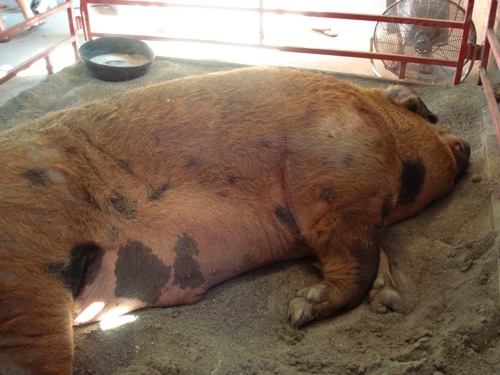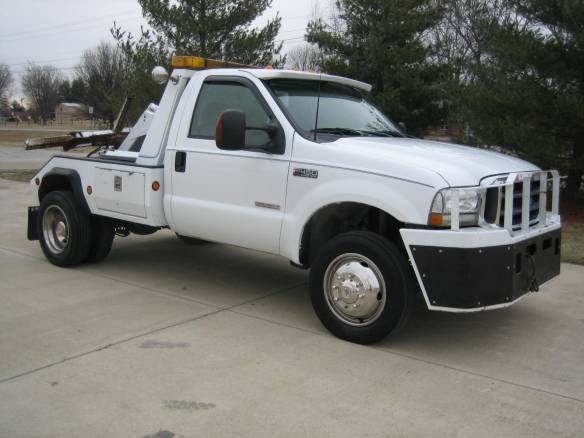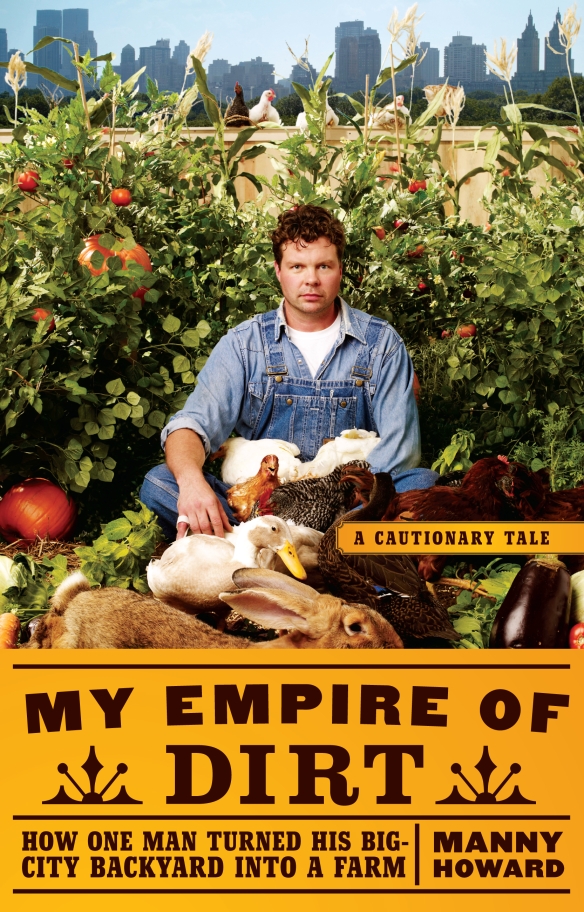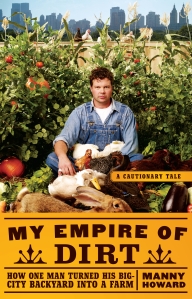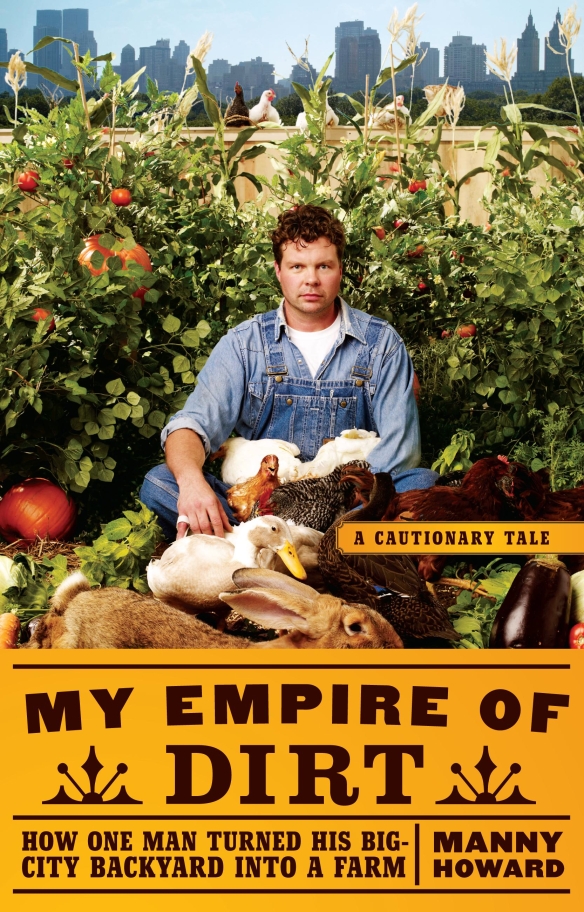 On Sale at Book-Sellers Nationwide and on-line
On Sale at Book-Sellers Nationwide and on-line
For seven months, Manny Howard—a lifelong urbanite—woke up every morning and ventured into his eight-hundred-square-foot backyard to maintain the first farm in Flatbush, Brooklyn, in generations. His goal was simple: to subsist on what he could produce on this farm, and only this farm, for at least a month. The project came at a time in Manny’s life when he most needed it—even if his family, and especially his wife, seemingly did not. But a farmer’s life, he discovered—after a string of catastrophes, including a tornado, countless animal deaths (natural, accidental, and inflicted), and even a severed finger—is not an easy one. And it can be just as hard on those he shares it with.
We now think more about what we eat than ever before, buying organic for our health and local for the environment, often making those decisions into political statements in the process. My Empire of Dirt is a ground-level examination—trenchant, touching, and outrageous—of the cultural reflex to control one of the most elemental aspects of our lives: feeding ourselves.
Unlike most foodies with a farm fetish, Manny didn’t put on overalls with much of a philosophy in mind, save a healthy dose of skepticism about some of the more doctrinaire tendencies of locavores. He did not set out to grow all of his own food because he thought it was the right thing to do or because he thought the rest of us should do the same. Rather, he did it because he was just crazy enough to want to find out how hard it would actually be to take on a challenge based on a radical interpretation of a trendy (if well-meaning) idea and see if he could rise to the occasion.
The Thanksgiving Day Massacre
Managed to get in the middle of it after lunch last Friday. Sitting in the car finishing up some correspondence on the thumb devil one minute, breaking up a fight outside that badguy social club next to the Chip Shop on Fifth Avenue the next.
Press send on a text and through the rear view mirror I’ve got one middle-aged man pounding, stiff as a statue, on a morbidly obese member planted on a chair outside the club. His assailant is screaming curses in time with the blows he’s landing and Fatty has his arms up protecting his face, but he’s getting the worst of it. I drop out of our Luxury German Automobile like a cross teacher on the playground. As I’m marching round the back bumper towards these graceless gladiators it becomes clear that the assailant isn’t entirely talentless, but he is drunk as a Lord.
Game changer. As I close on the melee Fatty launches off his chair fist first, connecting with Drunky’s nose. A testament to Newton’s Second Law, Fatty has no swing, just locked shoulder, elbow and wrist. And even with its paltry acceleration, when Fatty’s doughy fist makes contact with Drunky’s nose it’s all about the multiplier of Fatty’s enormous mass. The nose splatters, flattening instantly against Drunky’s face. Fatty doesn’t hang around to celebrate, rather continues, his arch uninterrupted, on his course, landing, a modest hillock, in the middle of the sidewalk. Too blasted to realize that his profile has been irrevocably altered, Drunky begins kicking Fatty who tries vainly to roll over on his back.
The club, a VFW Hall in name only, is a Known Location, so as you’d expect, the new arrivals aren’t the least bit concerned about the condition of the screaming drunk with the destroyed face. They are looking out for their own. A deeply-muscled thug pulls up in a tow truck, leaps into the street and chases Drunky through traffic off across the street where, face streaming blood, he stands defiant, if weaving unsteadily, and begins taunting Fatty. “Bury me? Bury me? You’ll bury me?”
Outnumbered now, Drunky appears satisfied to stand his ground, shouting from a safe distance. Tow Truck joins the three of us and together we haul Fatty–cold to the touch and completely disoriented, likely in the throws of massive heart attack–back into his chair. Tow Truck and the two ruffians are joined by an amigo (“Johnny? You okay, Johnny?”) and all four implore Johnny… “Fat” Johnny… to stay put in the chair. Fat Johnny just stares out on the scene like he is a million miles away.
Once satisfied that Fat Johnny is okay (which he absolutely is not), the ruffians pat him on the back, bid Fat Johnny take it easy and lope off in different directions away from the club.
Unattended, Fat Johnny immediately heaves himself out of his chair and back into the fray. Before he can take a single step he falls flat on his face, lets out a low moan, and lies stone still. I’m closest, so I’m first to try to grab him up. Joined by Tow Truck and yet another denizen of the VFW we drag the inert Fat Johnny back into his chair. “Maybe he should drink some water?” I suggest, certain he is dead.
“Yeah, water. Here Johnny, some water. Johnny, over here. Drink water. You okay.”
“Don’t move Johnny. Drink water,” says tow truck looking up and down the avenue. Drunky, still unaware he has no nose, is leaning heavily on a mailbox, berating Fat Johnny.”
“Okay,” says Tow Truck. “We’re good. Stay here Johnny. Drink water.” Johnny has touched a drop. That’s the best part, every new bad guy who swoops in to help is trying desperately to move on as soon as he arrives. Nobody wants to be around if the cops show up. I keep my eye on Tow Truck. He’s the smart one, a man of action, too. Tow Truck keeps his eye on me. We’re both wondering what I’m still doing on the scene. When we aren’t sizing each other up, scrupulously avoiding eye contact, Tow Truck is scanning for the avenue for official response. My gaze follows his. Drunky could have friends too. That would be bad.
Fat Johnny either falls asleep or dies.
It’s time to go.
Tow Truck hops into his ride and guns the huge engine, I’m back in the Luxury German Automobile, and the remaining ruffians vanish around corners and disappear into storefronts. It’s over. The only guys left on the block are Fat Johnny and Drunky.
Just Nail the Fish to the Fence and Preheat the Oven, Honey
Lisa just loves the greenmarket on Cortelyou Road. Every Sunday she returns with a report about how it has grown, or how busy it is. She presents the week’s trophy fruit or vegetable. This week Lisa said she’d purchased the most gorgeous fish. She called it a striper. I smirked. Nobody sells whole stripers at the greenmarket. Hours passed. Lisa worked intensely cleaning up after the painters. Howard Hall was more in the weeds than usual. The playroom ceiling had been replaced.
I did nothing. Worse than nothing, I played SPORE for the entire afternoon (I’d ordered the game when it first came out, but was only now trying it out. It’s completely absorbing).
The sun set. The kids argued. “So are you gonna cook this fish, or what?” demanded Lisa.
“Me?” shaking free from the care and feeding of my gayly painted two-legged carnivore with antlers, long, bony hands for grasping and nasty biting teeth. “I’m cooking the fish?”
“It’s too big for me to cook. And its got scales.”
“What is it?”
“I told you, a striper.”
“A bass? You mean a ‘sea bass.'”
“A striped bass.”
“Like this?” I asked, holding my hands seven inches apart.
“Much bigger.”
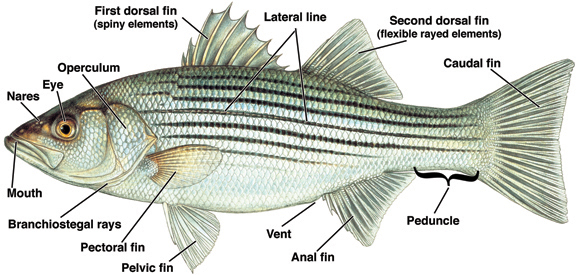
I held my hands nine inches apart. Lisa shook her head.
“A legal striped bass is 28 inches minimum.”
“At least.” Lisa nodded her head.
You bought a wild bass at the greenmarket? Not scaled? Is it gutted?”
“Nope,” said Lisa losing patience with my condescending questions. “The lady said it wasn’t hard to do.”
“It’s not, if you’ve done it a hundred times, but it’s always messy as hell.”
“Forget it!” Lisa stormed. “I thought it’d be fun. I’ll just throw it away. We’ll just have chicken fingers.”
“Throw it AWAY? A striper? Shit.”
“Forget it. You don’t have to do anything. I will. Just tell me how.”
“Tell you how?”
No problem, I taunted, all you need to do is remove the fins, scrape every single last scale of four square feet of fish skin, cut it from its gills to its anus and tug free a couple-three handfuls of icy cold fish guts. Oh, and then clean the god forsaken mess up before even turning on the stove. All at 6:30 on a Sunday. With that I stormed into the garage, found a ten-penny nail and a framing hammer, grabbed the fish (sure enough it had the tin tag looped from gob to gill vent) from on top of the cooler.
“Nice fish,” I said, impressed.
“I told you,” said Lisa.
I nailed the fish’s tail to the fence, turned to Lisa who was cold, and heading back inside. “No way. If I’m going to process this fish in the dark, you’re holding the flashlight.”
After some to-do I recovered two respectable fillets. After pawning off the guts and carcass on the chickens, I picked what remained of the broad leaves from the spindly fig tree and washed my hands and the leaves thoroughly. I sliced the fillets into single-serving pieces and then placed alternating layers–fig leaves, seasoned fish, olive oil–until the baking dish was full. The fish baked at a high heat to draw out the flavor and aroma from the fig leaves. I served it all with baked spaghetti squash seasoned with Chinese Five Spice (fennel, cloves, and cinnamon, star anise and Szechuan peppercorns) and steamed broccoli. (7 servings in 50 minutes, not including fish processing)
What are you doing for lunch this Wednesday?
“It’s a dad’s life” an anthem
Arrive Alive: Collioure, France to NYC
Awake before the fishermen of Collioure (I know because I went down to the wharf to see if I could watch them prep for the day, before hitting the road).
I arrive before the airport opens in Perpignan
Thunderstorms at Orly delay departure from Perpignan, chopping away at Orly-CDG transfer opportunity
20E bribe to cabby to get me to CDG before noon works.
Roll into CSG just in time for scores of soldiers (or some such with assault rifles) to compress 10 check-in gates into two because, as one airport employee explains, “We have bomb, here, msr.”
Nobody gives a shit. everybody pushing to get to a kiosk to check in. Bad info is flying all over the place. kiosks are smoking and going dark, then BANG!… not BOOM… some poor twat has just had all his traveling worldlies (or the appalling sex toys he was afraid to reveal to security) that he’d left unattended detonated under a heap of lead blankets and a ballistic plastic blast shield.
Crown applauds lustily, goes back to dog-eat-doggery of airport check-in.
Dressed smart in jacket and proper shirt, I haughtily wave my passport and skip past the functionary at the first class/VIP security line. She calls out “Are you with them?” gesturing to three similarly attired travelers, I nod, of course, silly.
I arrive at The gate to discover, Air France has overbooked flight 018 to Newark and me (and the exit row seat I’ve human engineered) have been put on stand-by list until a late-arriving connecting flight from god knows where has arrived and (this was unstated, but obvious) those ticket-holders with more Air France frequent travel miles than me can board first.
Oh no I haven’t, I explain. I’m here now, hon. I’ve got a seat. Says so right here, it’s called 29J and I’m sitting in it. When your late arriving friends show up, they can have whatever seats are left, but I’m here, and I’ll have my seat thanks ever so much.
She tells me I do not understand.
I explain that I understand perfectly clearly, I just don’t agree with the plan.
I’m here, they’re not: My seat. Now please check me through, thank you.
Non, msr. Please you to wait. It will be okay.
Agreed… As long as my ass is in 29J, madame.
Don’t make trouble for all of us, spits an old duck from America, with a mix of anger and fear on her face, also in the stand-by line.
This isn’t trouble, hon. Trouble comes when I dont get my seat. I return her pinched disapproval with a dark menacing smile, and then clock a second gate attendant flirting with a gray haired French man (I hope he’s French, if he’s not, the outfit is inexcusable) while both lean over examining the flight information. I wait, patient/courteous, for the flirting to stop. She and I talk. We are reasonable people. We smile, we laugh sardonically about the bomb; scare c’est la vie and all that. She speaks with The Shrew guarding the gate. Time passes. My name is mispronounced over the klaxon. Air France is ready to board ticket-holder Chaahrlz OW-ahrd. Shortly after I board the shuttle bus to the plane, The Old Duck boards the bus, as well, trying not to make eye-contact.
You get in trouble, too? I ask.
She hates me.
An Essay from Powell’s.com about writing “My Empire of Dirt”
When I talk to people about My Empire of Dirt, I tell some outrageous stories from the year I spent turning my back yard in Flatbush, Brooklyn, into a farm that would, with the exception of salt, pepper, and coffee beans, sustain me for at least a month. Some of the tales are — or at least are intended to be — funny, some provocative, some poignant, and some heartbreaking. And when I finally finish talking, the first question is always, “Do you still have the farm?
Hell yes, I reply, and then immediately I equivocate, call it a marriage-preserving compromise.
Manny Howard gives a tour of his backyard farm in Brooklyn.
Yet Another Simple Farmer finds Himself Interviewed on NPR
The Only Real-Time Evidence of Life On The Farm
Read An Excerpt From My Empire of Dirt
Fifteen minutes gone that we can never get back and all we are doing is staring through the wrought-iron railings of the Promenade fence out over the East River, two eight-year-olds just stuck inside a day. There are no bullies to run from in the park, no rats to stalk in the undergrowth beyond the playground. Though, it’s true, we have never, either of us, ever seen a black party balloon before, still we ran out of good stuff to throw at the one stuck in the tree above us almost right away. Our bikes haven’t turned into police motorcycles yet. This is not an adventure at all.
A soot-smeared orange ferry on its way to Staten Island drifts out of its decrepit, oxidizing dock at the Battery. A tugboat with a gravel barge stuck to its nose pushes its way against the current and, ever so slowly, upriver toward, and eventually beyond, the Brooklyn Bridge. We lay limp against the fence, both unable to imagine how we will survive this endlessly dull day ahead, but both too polite to complain to each other.
Hey, wait. There it is right in front of us. We aren’t pressing our faces up against the fence rails anymore; suddenly these are the twisted bars of a great, dark cage, and right there, staring back at us, is Adventure. “Let’s build a raft,” I breathe, too excited to speak the words.
Chris’s eyes strain against the side of his skull, trying to see my face, gauge my intention without taking his head away from the sun-warmed metal bars. “A raft out of what?”
“Wood,” I say, not certain that rafts can be built from anything else.
“Where would we go?” my friend asks.
“There.” I point with my arm fully extended through the bars out across the river, north of the Fulton Fish Market, to the only visible sliver of beach on Manhattan Island.
“Where will we get the wood?” asks Chris, quickening to the plan.
“I’ll show you,” I reply, the plan coming together as I gallop the few yards to my bike. It is yellow, has a black banana seat, and best of all it has three speeds. The gear shifter looks just like one in a cool muscle car. Rather than being on the chrome handlebars, it’s mounted on the crossbar. The selector has a pommel grip you pull toward you as you work through the gears. It shows the gear you’re in with a red line next to each number, one, two, three. If I pedal hard enough, I have convinced myself, sparks will shoot out of the pipe at the back just behind my seat where the chrome plastic cap has fallen off and left an exhaust-pipe kind of hole. We mount our bikes and make our way north along the Promenade, fly down Suicide Hill to Old Fulton Street and the abandoned cobbled streets beyond, under the noisy roadway of the Brooklyn Bridge and down New Dock Street, which ends hard against the East River. Beyond the low guardrail that we are scrambling over, the river has long since swept the tar-flecked wooden mooring posts and concrete docking into a chaos of enormous, jutting, broken teeth. It functions as a maw, catching the flotsam of a river at its environmental nadir. Collected here among the filth is everything two eight-year-old boys in search of adventure could ever need to build a raft.
The rest of the day and—because Chris is sleeping over and then my mom says it is okay for us to spend the whole day—the next were filled scrambling across the collapsed pier, collecting odd lengths and diameters of rope and faded scraps of plastic—once umbrellas, municipal office-furniture upholstery, buckets, a red flip-flop. We pry planks and boards of waterlogged, tar-streaked wood from between the concrete slabs, slipping in up to our knees in the filthy, whirling eddies as the current first ebbs, then flows.
At the end of the second day when we return home near what we estimated to be dinnertime, Chris’s dad, Mr. Dupassage, is waiting for us outside my apartment building. He leans impatiently against his orange BMW 2002, arms folded until we come to a tire-screeching skid a few feet from him. I’m sure that the orange BMW is the first European car I’ve ever seen. Chris says his dad can go a hundred miles an hour in it. Mr. Dupassage wants to know what is all over our clothes. Chris does not tell him that the tar on our hands and faces and shoes and jeans and our nearly identical terry-cloth polo shirts is from the wood we salvaged for the raft we are going to build.
Chris says he does not remember what it is. I straddle the crossbar of my yellow banana-seat bike, studiously watching the derailleur move when I shift gears. I think that Chris might be ashamed of our raft adventure.
Opening the trunk of his orange European car, Mr. Dupassage tries another tack, asks Chris where the stuff all over his clothes came from. Chris says he does not remember that either.
Mr. Dupassage takes a lime green towel from the trunk and shakes white paint flecks off it onto the faded gray asphalt of the street and, draping it over the supple, beige leather passenger seat, warns Chris that he is going to have to sit right on the towel and not move a muscle the whole way home or he might get that stuff on his clothes all over the upholstery of the orange European car.
I wonder if sparks come out of the back of Mr. Dupassage’s orange car when he goes one hundred miles an hour in it. Mr. Dupassage smiles when he says good-bye to me. He tells me to be careful not to touch the walls in the halls or in the elevator on my way upstairs, then he gets into his orange car. I think the car must be going almost one hundred miles an hour when it reaches the corner, but from where I am standing, still straddling my yellow banana-seat bike, I can’t see any sparks flying out behind it.
Chris is French, or his parents are, or his father is. I wonder how long it takes to get to France from Pierrepont Street. My mom calls from the window on the second floor where we live. She wants to know if I know what time it is. I look at the red LED readout on my Texas Instruments watch and I tell her it is eight fifty-six.
In the elevator, when I lean against the wall, some of the tar from the raft wood wipes off my shirt onto the brown-and-white-flecked enamel wall. I suppose that French people must not like rafts very much. French people like river barges better than rafts.
When my mom tells me to explain how I got myself covered in tar, I tell her that Chris and I are building a raft to sail across the East River.
The East River is not, in truth, a river. It is a tidal strait that joins with the Harlem River, also a part of the same tidal strait that was painstakingly, over twenty years during the nineteenth century, hollowed out to accommodate ship traffic. This strait connects the Long Island Sound up north to New York’s Upper Bay and the Atlantic Ocean beyond to the south. Because the narrow waterway joins two such whopping great bodies of water, the tide roars up during the flow tide, then twelve hours later, down during the ebb tide. In its narrower stretches the tide moves at speeds approaching six knots. Manhattan turned the riverbank to stone on its western bank, as did Brooklyn and eventually Queens on the opposite shore, so now, call it a tidal strait or a river, it is more a sluice than a naturally occurring body of water. People who fall or dare to jump in it have few places where they can pick their way out. The East River hosts a handful of accidental drownings every year.
For this and many other reasons, the East River is no place for an eight-year-old to play. Another person’s mother might have made this point immediately after her son announced his intentions to cross it on a raft that he and his buddy Chris Dupassage planned to build from found material piling up on the tide line along its rocky banks and fetid beaches. Not my mother. She supported every insane notion or scheme I ever presented to her. It was a conscious—determined, really—effort to shield what she considered my creative gift, to protect my imagination, my notion of the possible, from the crush of practical reality.
The lower reaches of the East River have teemed with traffic since the earliest Dutch settlements in the 1670s, and I spent most of my childhood living up on the bluffs above Old Fulton Street, the site where, in 1814, Robert Fulton inaugurated regular steamboat-ferry service between Brooklyn and Manhattan and made Brooklyn boom. The ferry kept Brooklyn’s economy running, fueled its growth from Dutch farming village to throbbing Anglocentric factory town and international port until 1924, forty-one years after the Brooklyn Bridge was completed. The cobblestone streets bustled and the town became a city. The horse-drawn construction of the Eagle Warehouse and all the other warehouses and towering factories put an end to any doubt that Brooklyn was rising just as confidently as its neighbor across the river. By the 1970s, though, those factories and warehouses were slipping into decrepitude, creating a vacant canyon land where packs of dogs and kids on bikes from the various bordering neighborhoods competed for territory among the low-slung, Civil War–era brick warehouses with rusting, arched iron doors that still smelled of the pepper they once housed. Here on the flats stood a dozen monolithic, white cement factories built at the turn of the nineteenth century by the Scottish-born king of the cardboard box, the industrialist Robert Gair. In 1926, Gair moved his light-industrial empire upstate to Piermont. By the 1970s, “Gairville” had become a collection of empty or emptying monuments to the slow death of urban manufacturing.
A week passes and Chris still hasn’t returned to fix our raft. During that gap I check on our pile of salvaged raft material at least twice a day. If, when I get down to the river’s edge, any other kids happen to be hanging around on the north side of New Dock Street, in the paved lot long since gone to seed, forsaken by its owner, or the city or whoever abandons the vast spoiled tracts in the landscape of my childhood, I wait for them to leave, to leave without molesting our raft pile. I position myself a calculated distance from our pile. Not so close that I will draw attention to the salvage, but near enough so that if some nosy kid does notice the pile, he’ll know it is mine and that I am watching him. I worry a lot about what I’ll do if the nosy kid who does notice our raft-makings also wants to build a raft and sail it across the East River. I worry especially about what I will do if that nosy kid who shares my nautical ambitions is much bigger or more aggressive than me. But I stay at my post by the pile all the same. I lie on my back on the sun-baked pavement, my shoulders propped against a discarded tire—hundreds and hundreds of tires are heaped behind the concrete wall of the Sanitation Department depot on the south side of New Dock Street. I lie on the hot sidewalk, my chin resting on my chest just like James Coburn in The Magnificent Seven. His shoulders on his saddle, his chin on his chest, his back in the dust of that West Texas cattle station, he reclines, unconcerned and unmoving, while dangerous men fuss needlessly around him.
Time passes slowly out here on the river. I catalog the hours. I count the days. Try to calculate the minutes until Chris returns to the raft. While I am not picking over the ingredients of our unmade raft, I am filling a composition notebook. It is a diary of the project, an account of the project and a fable of the adventures to come, with meticulously drafted plans for The Raft’s construction. Chris never does return.
I am grown now. I am still restless. Often uncomfortable in my husk, feeling it tighten around me when the world falls quiet. Those who know me well have grown used to both grand gestures and grim antics. I come through in a pinch if a spasm of physical strength (and, on the rare occasion, bravery) is required. I fall down on the job if the most rudimentary clerical precision is called for. My mind is a whirl; concocting stories, nursing regret, scheming, and—more often than I like—suspecting the worst. I talk too much and I listen intently.
This past February, suffering through a three-month hangover, the result of a failed effort at a career change, I am untethered, undone really.
Years of magazine writing had taught me to trust that after a requisite period of inward-aimed anger, doubt, and pity, inspiration always returns. The plan had been to bide my time, await the rebound strategy, the plan for renewal or reinvigoration that has always been just one good night’s sleep away.

